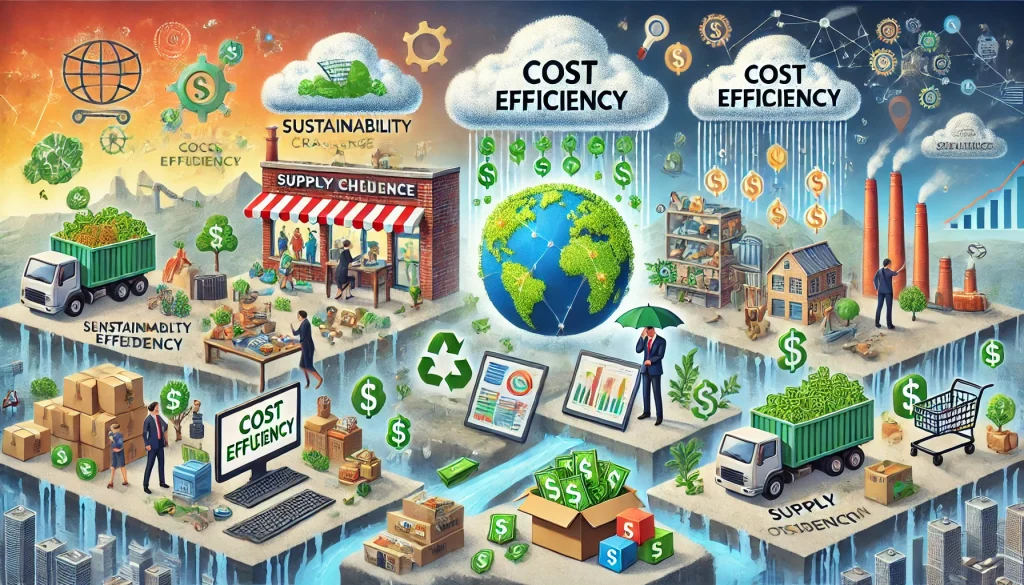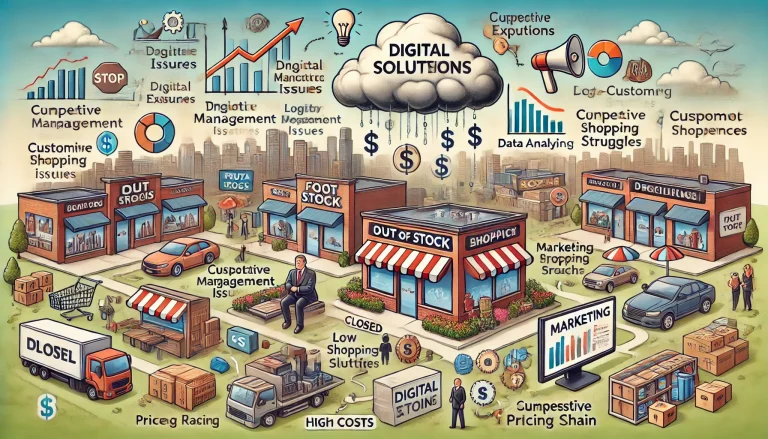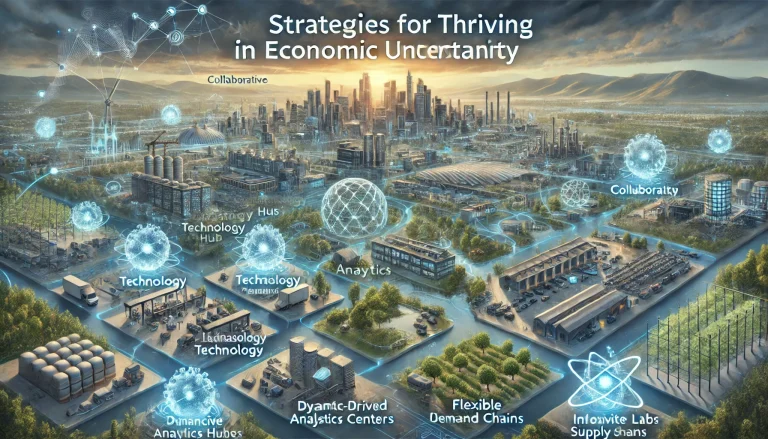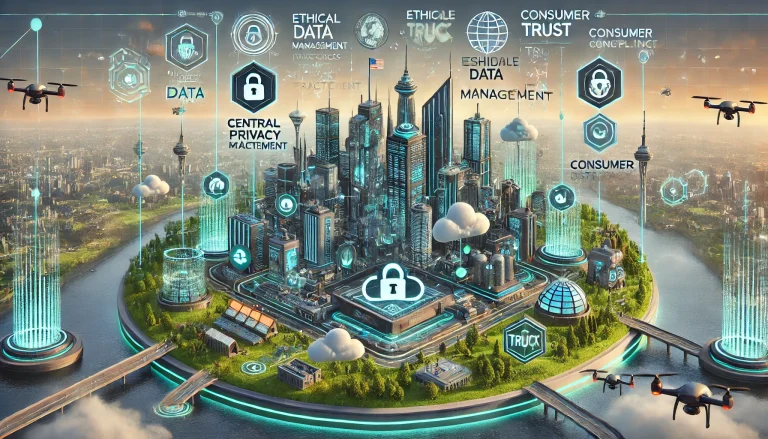Problem Statement
The retail industry faces significant challenges in achieving sustainability, especially in supply chain management. Retailers are under increasing pressure to reduce their environmental impact, ensure ethical sourcing, and provide transparency about the origins of their products. Balancing these sustainability goals with the need for cost efficiency and meeting consumer demand for fast, affordable products is complex. Traditional supply chains are often opaque, resource-intensive, and prone to unethical practices, leading to environmental degradation and social inequities. Innovative solutions are needed to create sustainable, transparent, and efficient supply chains that align with modern consumer expectations and regulatory requirements.
Pain Points
- Environmental Impact: High carbon footprint and resource consumption throughout the supply chain.
- Ethical Sourcing: Difficulty in ensuring fair labor practices and sourcing from ethical suppliers.
- Transparency: Lack of visibility into the origins and journey of products.
- Cost Efficiency: Balancing sustainability initiatives with maintaining cost efficiency.
- Consumer Demand: Meeting consumer expectations for fast and affordable products while being sustainable.
- Compliance: Adhering to increasing regulatory requirements related to sustainability.
- Waste Management: Managing and reducing waste generated in the supply chain.
- Supplier Coordination: Coordinating with a diverse and global network of suppliers.
- Technology Integration: Integrating advanced technologies for sustainable supply chain management.
- Data Utilization: Effectively using data to drive sustainability initiatives and track progress.
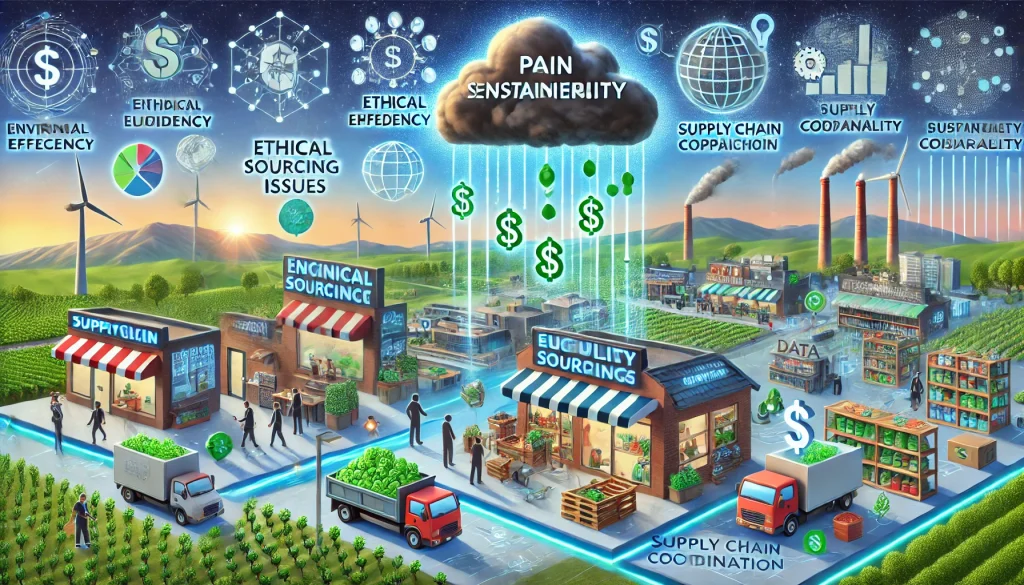
Future Vision
Our vision is to develop a comprehensive platform that transforms retail supply chain management towards sustainability. This platform will integrate advanced technologies such as blockchain for transparency, AI for optimizing supply chain efficiency, and IoT for real-time monitoring of environmental impact. It will provide tools for ensuring ethical sourcing, waste management, and compliance with sustainability regulations. Retailers will be able to balance cost efficiency with sustainability goals, meet consumer demand for sustainable products, and reduce their overall environmental footprint. The platform will foster collaboration among all stakeholders, from suppliers to consumers, creating a more sustainable and transparent retail ecosystem.
Use Cases
- Blockchain for Transparency: Using blockchain technology to trace the origins and journey of products, ensuring transparency and authenticity.
- AI-Driven Supply Chain Optimization: Utilizing AI to predict demand, optimize inventory, and reduce waste.
- Ethical Sourcing Verification: Tools for verifying and certifying ethical practices among suppliers.
- Real-Time Environmental Monitoring: IoT devices to monitor and manage environmental impact throughout the supply chain.
- Regulatory Compliance Management: Automated tools for ensuring compliance with sustainability regulations.
- Consumer Engagement: Features for educating consumers about the sustainability practices of their purchases.
- Waste Reduction Strategies: Implementing waste management solutions and circular economy practices.
- Cost-Benefit Analysis: Tools for balancing cost efficiency with sustainability initiatives.
- Sustainability Reporting: Comprehensive reporting tools to track and communicate sustainability progress.
- Supplier Collaboration Portal: A platform for suppliers to collaborate on sustainability initiatives and share best practices.
Target Users and Stakeholders
Target Users:
- User: Retail supply chain managers, sustainability officers, and procurement professionals
- Age Group: 30-50 years
- Gender: M/F
- Usage Pattern: Daily use for managing and monitoring supply chain sustainability.
- Benefit: Enhanced transparency, reduced environmental impact, and improved compliance with sustainability standards.
Stakeholders:
- Retailers: Primary users implementing sustainable supply chain practices.
- Suppliers: Partners providing ethically sourced and sustainable products.
- Consumers: Beneficiaries of transparent and sustainable products.
- Regulators: Entities ensuring compliance with sustainability laws and standards.
- Investors: Financial stakeholders interested in the sustainability performance of retailers.
- Technology Providers: Partners offering advanced technologies for supply chain management.
Key Competition
- EcoVadis: Provides sustainability ratings and scorecards for global supply chains.
- SAP Ariba: Offers a procurement solution with a focus on supplier risk and sustainability.
- IBM Blockchain: Utilizes blockchain technology for supply chain transparency and traceability.
- Sourcemap: Supply chain mapping software for transparency and risk management.
- Greenstone: Offers sustainability and environmental management software for supply chains.
Products/Services
- EcoVadis: Sustainability ratings, scorecards, and improvement plans.
- SAP Ariba: Supplier management, procurement solutions, and sustainability risk assessments.
- IBM Blockchain: Blockchain technology for supply chain transparency and ethical sourcing.
- Sourcemap: Supply chain mapping, risk management, and transparency tools.
- Greenstone: Environmental management software, sustainability reporting, and compliance tools.
Active Startups
- Provenance: Provides blockchain-powered transparency solutions for supply chains.
- ClearMetal: Offers supply chain visibility and predictive analytics.
- SupplyShift: Supply chain sustainability management and risk assessment platform.
- Everledger: Blockchain technology for traceability and transparency in supply chains.
- Circular IQ: Tools for circular economy practices and sustainability assessments.
- TrusTrace: Supply chain transparency and traceability platform.
- EcoChain: Environmental footprint management software for supply chains.
- Toitū: Provides carbon certification and environmental impact assessments.
- Resilinc: Supply chain resilience and risk management platform.
- Sustainalytics: Provides ESG (Environmental, Social, and Governance) data and analytics.
Ongoing Work in Related Areas
- Development of AI-driven predictive analytics for supply chain optimization.
- Innovations in blockchain technology for enhanced supply chain transparency.
- IoT solutions for real-time environmental monitoring and management.
- Circular economy initiatives for waste reduction and resource efficiency.
- Advanced data analytics for tracking and reporting sustainability metrics.
Recent Investment
- EcoVadis: $200 million investment from CVC Growth Partners II (January 2024)
- SAP Ariba: $150 million investment in sustainability and risk management solutions (March 2024)
- IBM Blockchain: $100 million investment in supply chain transparency technology (February 2024)
- Provenance: $50 million Series B funding for blockchain-powered transparency solutions (April 2024)
- ClearMetal: $60 million Series C funding for supply chain visibility and predictive analytics (May 2024)
Market Maturity
The market for sustainable supply chain solutions is maturing, driven by increasing consumer demand for transparency and ethical practices, as well as regulatory pressures. Companies are investing heavily in advanced technologies such as AI, blockchain, and IoT to address these challenges. The competitive landscape is evolving, with both established players and innovative startups contributing to the development of more sustainable supply chain practices.
Summary
Sustainability in supply chain management is a critical challenge for the retail industry. Retailers face pressure to reduce their environmental impact, ensure ethical sourcing, and provide transparency about product origins. Balancing these sustainability goals with cost efficiency and consumer demand for fast, affordable products requires innovative solutions. Our proposed platform aims to address these challenges by integrating advanced technologies such as blockchain for transparency, AI for supply chain optimization, and IoT for real-time environmental monitoring. It will provide tools for ethical sourcing verification, waste management, and compliance with sustainability regulations. By empowering retailers with these solutions, we aim to create a more sustainable and transparent retail ecosystem, meeting modern consumer expectations and regulatory requirements.
